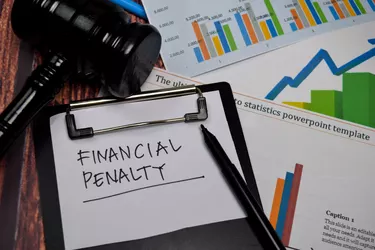
While there is no universal mutual fund early withdrawal penalty, there are circumstances wherein a mutual fund withdrawal could have financial consequences. Depending on the share class purchased, the type of account the fund is purchased in, and other miscellaneous requirements of the mutual fund company, there may be fees attached to mutual fund withdrawals.
Video of the Day
Class B shares represent the mutual fund share class most often associated with penalties for early withdrawal. Unlike other fund share classes, with Class B shares, you only pay a back-end commission to the broker when you sell the shares.
Video of the Day
Known as a deferred sales charge (DSC), the fee for selling Class B shares normally declines by 1 percent every year and lasts for five or six years, after which there is no charge at all. A typical DSC might start at 5 percent in the first year and drop to 4 percent in year two, 3 percent in year three, and so on. Thus, if you sell Class B shares in fewer than five years, your DSC could be considered a mutual fund early withdrawal penalty.
Class C shares are sometimes called "level-load" shares. Usually, there is no up-front charge to buy them. All your money goes to fund your investment. Often, this share class imposes a charge of 1 percent if you sell them within the first 12 months.
Class C shares usually have higher asset-based sales charges than Class A ones. Investors will continue to pay higher annual expenses as long as they hold Class C shares in their portfolio.
Class A shares normally have an upfront sales commission of up to 5 percent of the amount invested. Some mutual fund companies allow investors to purchase Class A shares at net asset value (N.A.V.), meaning with no sales charge. Usually, these purchases must be in the amount of $1 million or more. In exchange for the elimination of the sales fee, most fund companies require investors who purchase Class A shares at N.A.V. to keep their money invested for at least one year to avoid an early redemption fee.
Mutual Funds in IRA Accounts
If any mutual fund is purchased in an Individual Retirement Account (IRA), the Internal Revenue Service (IRS) may levy an early withdrawal fee if the funds are distributed from the IRA. Specifically, the IRS imposes a 10 percent early withdrawal penalty on most funds taken out of an IRA before the account holder reaches the age of 59 1/2. Exceptions to the 10 percent withholding rule include distributions for higher education expenses, the first-time purchase of a home, or due to disability.
If you sell a mutual fund and take a cash distribution of the proceeds within the first two years of participating in a SIMPLE-IRA, you will be charged an additional 25 percent tax in addition to any sales charges levied by the mutual fund company.
Penalties for Selling Mutual Funds
If you sell mutual fund shares that you have held for one year or less, any gain you realize on your sale will be taxable at ordinary income tax rates, as opposed to the more favorable capital gains tax rates. As with all investments, those held for longer than one year are taxed at a top rate of 15 percent, as of 2021. If you are in a higher tax bracket, treating your mutual fund as a short-term investment could result in a substantial tax penalty.
Consider Also: What are Mutual Funds?